仁爱科普版八年级上册 Unit 3 Our Hobbies Topic 3课件(共48张PPT)
文档属性
| 名称 | 仁爱科普版八年级上册 Unit 3 Our Hobbies Topic 3课件(共48张PPT) | 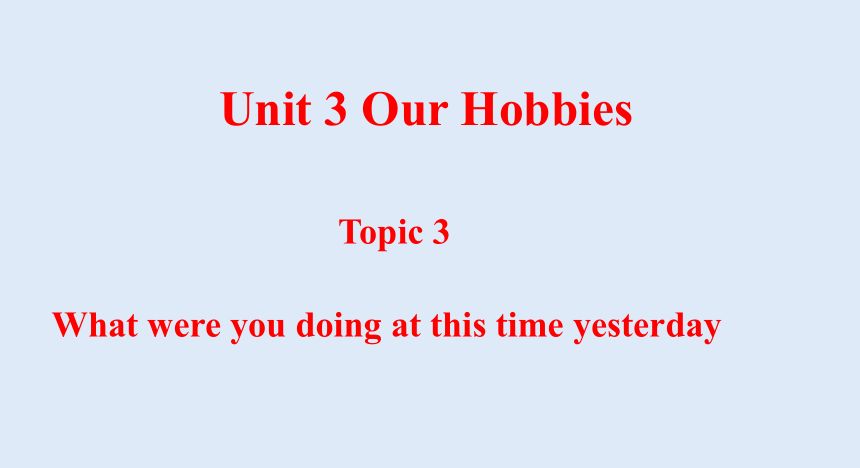 | |
| 格式 | pptx | ||
| 文件大小 | 792.4KB | ||
| 资源类型 | 教案 | ||
| 版本资源 | 仁爱科普版 | ||
| 科目 | 英语 | ||
| 更新时间 | 2023-07-13 17:42:33 | ||
图片预览

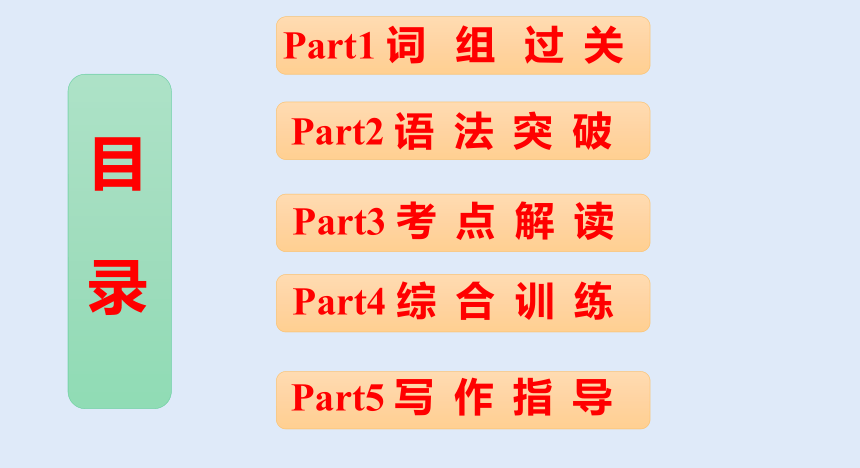

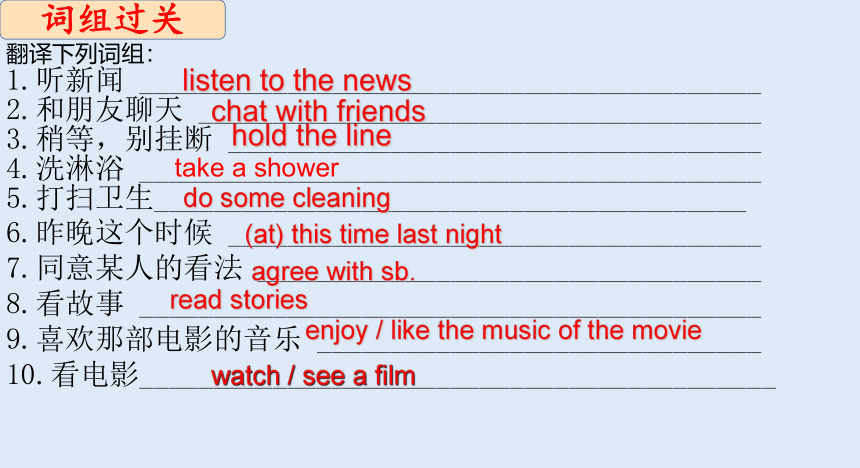
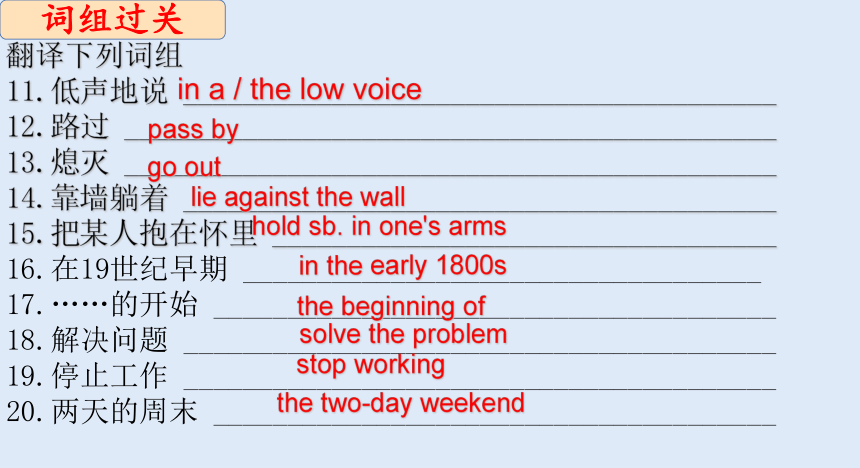

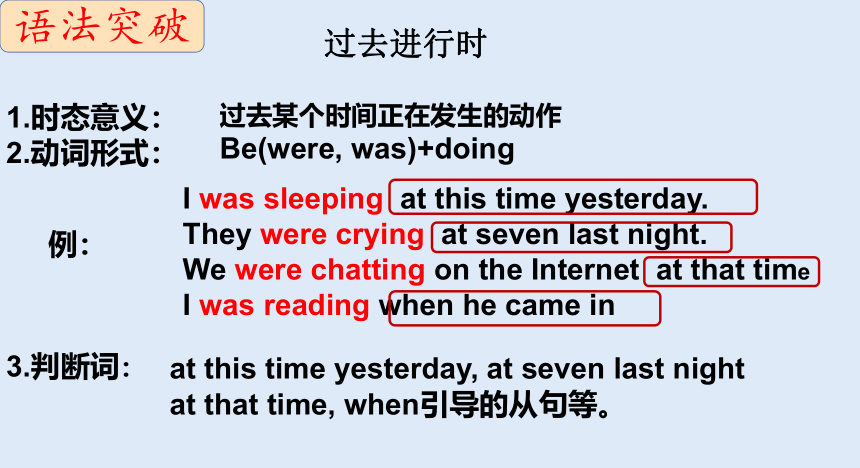
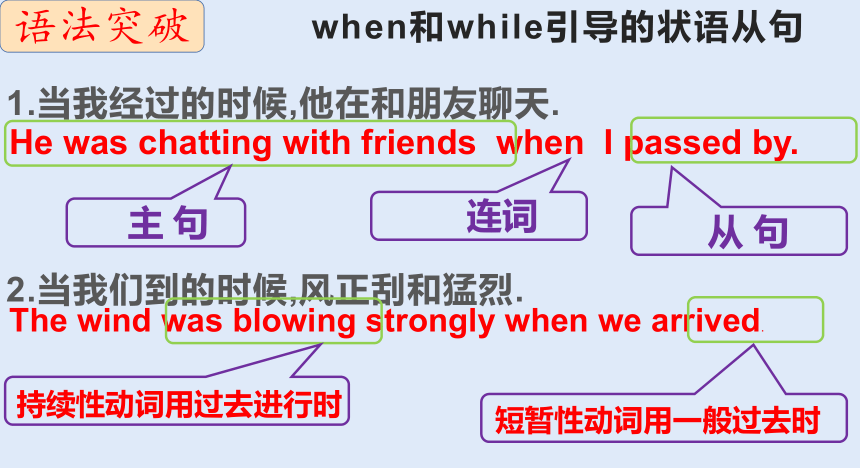
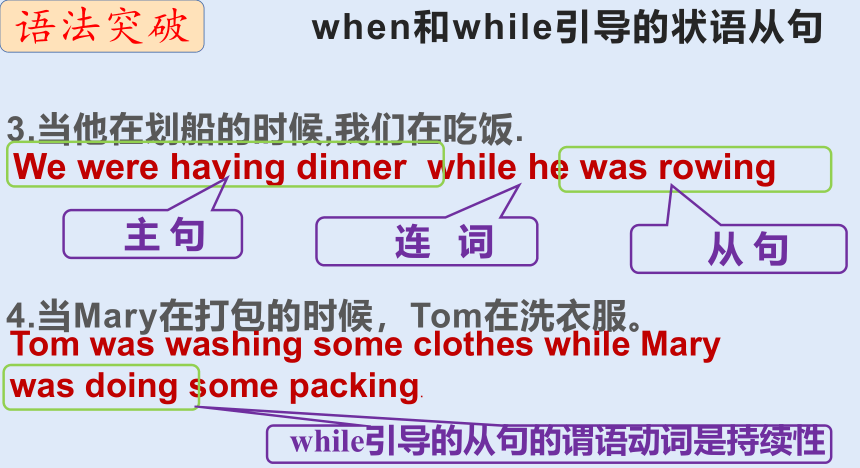
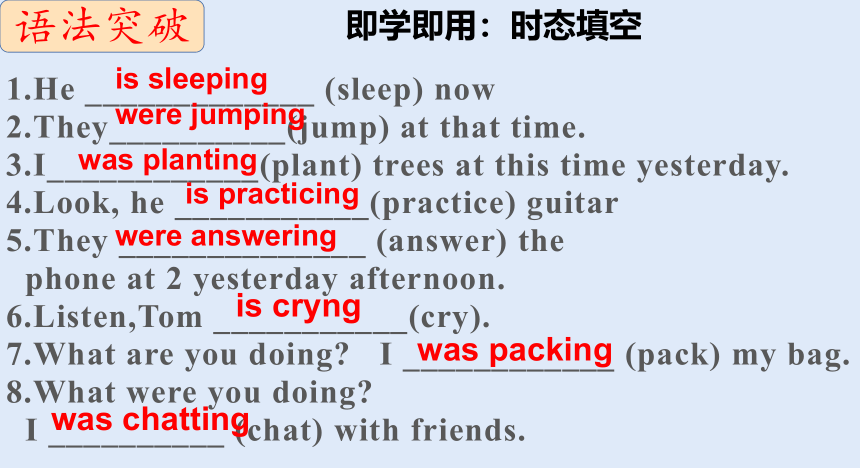
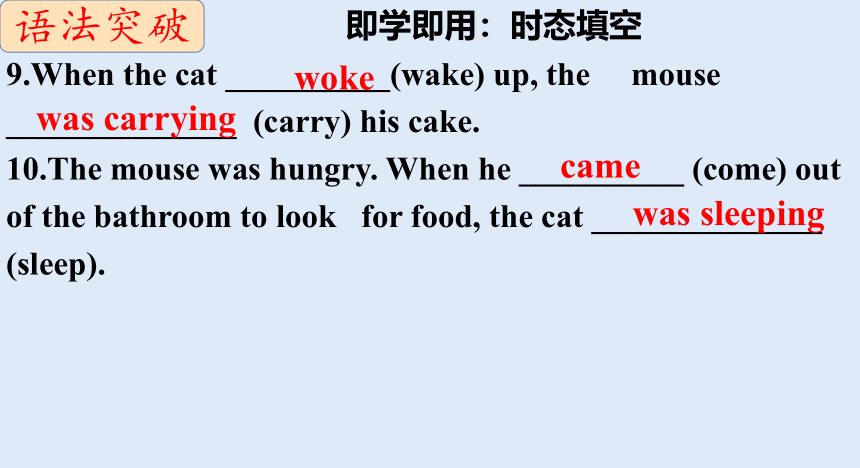
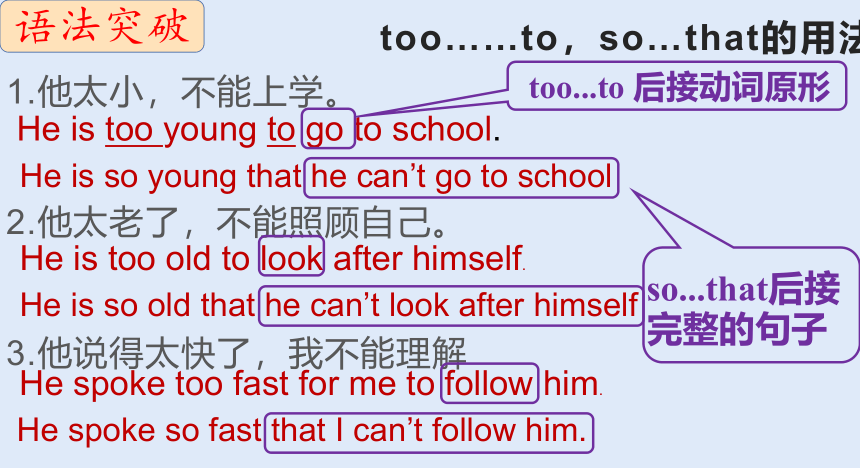
文档简介
(共48张PPT)
Unit 3 Our Hobbies
Topic 3
What were you doing at this time yesterday
目
录
Part1 词 组 过 关
Part5 写 作 指 导
Part4 综 合 训 练
Part3 考 点 解 读
Part2 语 法 突 破
Part 1 词 组 过 关
翻译下列词组:
1.听新闻 __________________________________________
2.和朋友聊天 ______________________________________
3.稍等,别挂断 ____________________________________
4.洗淋浴 __________________________________________
5.打扫卫生________________________________________
6.昨晚这个时候 ____________________________________
7.同意某人的看法 __________________________________
8.看故事 __________________________________________
9.喜欢那部电影的音乐 ______________________________
10.看电影___________________________________________
listen to the news
chat with friends
hold the line
take a shower
do some cleaning
(at) this time last night
agree with sb.
read stories
enjoy / like the music of the movie
watch / see a film
词组过关
翻译下列词组
11.低声地说 ________________________________________
12.路过 ____________________________________________
13.熄灭 ____________________________________________
14.靠墙躺着 ________________________________________
15.把某人抱在怀里 __________________________________
16.在19世纪早期 ___________________________________
17.……的开始 ______________________________________
18.解决问题 ________________________________________
19.停止工作 ________________________________________
20.两天的周末 ______________________________________
in a / the low voice
pass by
go out
lie against the wall
hold sb. in one's arms
in the early 1800s
the beginning of
solve the problem
stop working
the two-day weekend
词组过关
Part 2 语 法 突 破
过去进行时
1.时态意义:
2.动词形式:
3.判断词:
过去某个时间正在发生的动作
Be(were, was)+doing
I was sleeping at this time yesterday.
They were crying at seven last night.
We were chatting on the Internet at that time
I was reading when he came in
例:
at this time yesterday, at seven last night
at that time, when引导的从句等。
语法突破
when和while引导的状语从句
1.当我经过的时候,他在和朋友聊天.
2.当我们到的时候,风正刮和猛烈.
He was chatting with friends when I passed by.
The wind was blowing strongly when we arrived.
主 句
连词
从 句
持续性动词用过去进行时
短暂性动词用一般过去时
语法突破
3.当他在划船的时候,我们在吃饭.
4.当Mary在打包的时候,Tom在洗衣服。
We were having dinner while he was rowing
Tom was washing some clothes while Mary
was doing some packing.
when和while引导的状语从句
主 句
从 句
连 词
while引导的从句的谓语动词是持续性
语法突破
1.He _____________ (sleep) now
2.They__________(jump) at that time.
3.I____________(plant) trees at this time yesterday.
4.Look, he ___________(practice) guitar
5.They ______________ (answer) the
phone at 2 yesterday afternoon.
6.Listen,Tom ___________(cry).
7.What are you doing I ____________ (pack) my bag.
8.What were you doing
I __________ (chat) with friends.
is sleeping
were jumping
was planting
is practicing
were answering
is cryng
was packing
was chatting
语法突破
即学即用:时态填空
9.When the cat __________(wake) up, the mouse ______________ (carry) his cake.
10.The mouse was hungry. When he __________ (come) out of the bathroom to look for food, the cat ______________ (sleep).
woke
was sleeping
came
was carrying
语法突破
即学即用:时态填空
too……to,so…that的用法
1.他太小,不能上学。
2.他太老了,不能照顾自己。
3.他说得太快了,我不能理解
He is too young to go to school.
He is too old to look after himself.
He spoke too fast for me to follow him.
He is so young that he can’t go to school
He is so old that he can’t look after himself
He spoke so fast that I can’t follow him.
too...to 后接动词原形
so...that后接
完整的句子
语法突破
Part 3 考 点 解 读
知识点01 when, while的用法 (教材Page71 1 a)
when,while的意思都是“当...时”,都可以引导时间状语从句。
(1) while “当...时候”,引导时间状语从句,从句中用延续性动词,主从句中的动作同时发生。
I was doing my homework while my mother was watching TV. 当我的妈妈正在看电视时,我正在写作业。
Please write while I read. 当我读的时候请你写一写。
(2) when “当...时候”,引导时间状语从句,从句用延续和非延续性动词皆可,主从句动作同时、先后发生都可以
It was snowing when I went out. 当我出去的时候正在下雨。
【即学即练】
_________ I was taking a shower, the dog came into the room.
A.While B.if C.Where
【答案】A
【解析】句意:当我洗澡的时候,狗进了房间。while “当...时候”,引导时间状语从句,从句中用延续性动词;when “当...时候”,引导时间状语从句,从句用延续和非延续性动词皆可,主从句动作同时、先后发生都可以。故A。
知识点02 Hold the line 稍等(教材P71 1a)
hold the line本意 “保持线路”,引申意为“稍等,等一会儿”,类似的表达还有hold on,just a monent (稍等)。
【即学即练】
-----____________ does the holiday last
----For a week.
A.How long B.How often C.How many
【答案】A
【解析】句意:这个假期要持续了多久?持续了一个星期。回答for a week 是时间段,故提问用how long。
知识点03 call sb 喊某人,打电话给某人 (教材Page71 1a)
给某人打电话的表达有:call sb; ring sb; phone sb; give sb a ring; call sb up; ring sb up
I give my mother a ring last night.
我昨晚给我母亲打了一个电话
知识点04. answer回答v.,答案n. (教材Page71 1a)
(1)answer作动词时,意为“回答”。
answer the phone 接电话
(2)answer作名词时,意为“答案,回复”。如果要表示“......的答案”,其后的介词是to,如:
the answer to the question 这个问题的答案
【即学即练】
Mr.Li picked up the phone and ________ when it rang.
A.received B.heard C.answered
【答案】C
【解析】句意:电话响起时,李先生拿起话筒接电话。考查词组answer the phone。
知识点05 doing some cleaning打扫卫生 (教材Page 71 1a)
“do some +某些动词的ing形式”,表示相应的动作。
do some cleaning打扫卫生 do some washing洗衣服
do some reading读书 do some shopping购物
I make Paul do some shopping.我让保罗去购物。
【即学即练】
Mr.Smith will ________________________________(打扫卫生)at home this weekend.
【答案】do some cleaning
知识点06 I agree 我同意(教材P71 1a)
表达“同意”可用I agree,I agree with you, I think so, You are right等。
表达“不同意”可用I don’t agree,I don’t agree with you, I don’t think so等
知识点07 agree with 同意 (教材Page 73 1 a)
agree 动词,意为“同意,应允”。反义词为disagree,名词agreement/disagreement。 agree with意为“同意某人的观点”。
表达同意可用下列表达法:
I agree (with you)
I think so.
You are (quite) right
表达不同意可用下列表达法:
I don’t agree (with you).
I don’t thinks so.
【典例】
---Do you think math is hard
---Yes. __________ But if you study hard, you can learn it well.
A.I agree with you B.It’s easy C.I don’t think so.
答案:B
【解析】句意:你认为数学很难吗?是,我同意。但如果你努力学习,你可以学得很好。
知识点08 pleasant,pleased, pleasure的区别 (教材Page73 1a)
pleasant 形容词 “令人愉快的,舒适的”
(1) please, 动词,“请;使高兴”
(2)pleasant, 形容词,作定语时,意为“令人愉快的”,一般用来修饰事物;
(3)pleased, 形容词,人做主语,be pleased to do sth; be pleased with sb./sth.,一般做表语;
(4)pleasure, 名词;
It’s my pleasure(回答别人的感谢);
with pleasure(乐意帮助别人)
【典例】
People like spring because it’s beautiful and the temperature is ___________
A.pleasure B.pleasant C.pleased
答案:B
【解析】句意:人们喜欢春天,因为它很美,而且温度也是舒适的。
知识点9 Isn’t it interesting 难道不是很有趣吗? (教材Page 73 1a)
Isn’t it intereting 难道它不是和美丽吗?这是一个否定疑问句,注意回答与事实相符是,用Yes,it is! 与事实不相符时,用No, it isn’t。
【典例】
---Isn’t the movie interesting ---___________. think it’s boring
A.Yes, it is B.No,it isn’t C.Yes, it isn’t
答案:B
【解析】句意:这部电影不是很有趣吗?---___________。我觉得这很无聊。反问句的回答:与事实相符是,用Yes,it is! 与事实不相符时,用No, it isn’t。
知识点10 match火柴;比赛;匹配
(1)match 可作名词,意为“火柴”。
He lit a match
(2)match作名词时,也可解释为“比赛”。
a football match
(3)match也可作动词,意为“匹配;使...匹配”
Please match the answer with the questions
【典例】
Would you mind passing me ____________________________(一合火柴)
【答案】a box of matches
知识点11 voice, sound, noise的区别(教材Page 75 1a)
sound,voice,noise这三个词都有声音的意思
(1)sound这个词意为“声音、响声”,其含义和使用范围较广,可指用耳朵听到的自然界的任何“声音”。
At midnight he heard a strange sound.
在午夜的时候,他听到了奇怪的声音。
voice这个词主要指人讲话或者唱歌的声音
He told me the news in a low voice.他小声告诉我这个消息。
(3)noise意为“噪音、喧闹声”,常指不悦耳、不和谐的嘈杂声。
Stop making so much noise. 别制造这么多噪音。
【典例】
-My sister has a sweet ____________ and she sings beautifully
A.A.noise B.sound C.voice
【答案】C
【解析】句意:我姐姐有一个甜美的嗓音,她唱得很漂亮。voice这个词主要指人讲话或者唱歌的声音
选A。
知识点12. beat和win的区别 (教材Page75)
(1)beat后接表示人及人的群体名词或代词作宾语,常用于游戏或比赛中战胜某人或打败某人。如:
Our class beat Class One in the table tennis match yesterday.
我们班昨天在乒乓球比赛中击败了一级选手。
(2)win后接表示事物的名词或代词作宾语,在句子中通常与game,match,prize等词搭配,表示在某项活动或比赛中获胜。如:
Who won the game 谁赢得了比赛?
【典例】It was raining hard, and the rain was ________against the door.
A.beating B.fighting C.playing
A
知识点13 wake up 唤醒,苏醒(教材Page 75 1a)
wake up意为“醒来”。wake sb up意为“把...叫醒”,注意代词放在中间。
【典例】
---Mom, please ________ me ________ at 6:00 tomorrow morning.
---OK.You’d better go to bed early tonight.
A.get;up B.wake;up C.put;up
【答案】B
【解析】句意:妈妈,请在明天早上6点叫醒我吗?。---好吧。你最好早点睡觉。
wake sb up意为“把...叫醒”,注意代词放在中间。
知识点14 a fourth match有一根火柴(教材Page 75 1a)
不强调先后顺序时,序数词前面不用定冠词,表示“又一,再一”
He won the match a second time.他又一次赢得了比赛。
【典例】
The movie is so interesting that he wants to see it ___________
two B.a second C.the second
【答案】B
【解析】句意:这部电影太有趣了,他很想去再看一遍。不强调先后顺序时,序数词前面不用定冠词,表示“又一,再一”
知识点15 in the early 1800s在19世纪早期 (教材Page 77 1a)
(1)in the early 1800s=in the early 19th centery在19世纪早期。“in the+整十的年份+s”表示多少世纪什么年代。
in the 1980s在二十世纪八十年代(从1980一1989)。
(2)“in the+序数词+century”表示“在第几世纪”。
in the 18th century在18世纪
【典例】Many workers in the factory were born _____________.
A.in the 1970s B.in1970s C.in the 1970
【答案】A
【解析】句意:工厂里的许多工人都出生在20世纪70年代。“in the+整十的年份+s”表示多少世纪什么年代。
知识点16 stop doing sth与stop to do sth(教材Page77 1a)
(1)stop doing sth.停止做(正在做的事)某事
The teacher is coming.Let’s stop talking.
老师来了。让我们停止说话。
(2) stop to do sth.停下(手中做的事)去做(别的)某事
I am tired. Let’s stop to have a rest.
我累了。让我们停下来休息一下吧。
【典例】Danny did all kinds of things to make the baby____.
A.to stop crying B.stop crying C. stop to cry
【答案】B
【解析】句意:丹尼做了各种各样的事情来阻止孩子哭。根据“make+do”可排除A。stop doing sth.意为“停止做(正在做的事)某事”。故选B。
知识点17. at the beginning of…在……开始的时候 (教材Page 77 1a)
at the beginning of…在……开始的时候
at the end of…在……结束的时候
【典例】It was a great day but we did not enjoy it_________ the beginning.
A.on B.for C.at
【答案】B
【解析】句意:这是美好的一天,但我们一开始玩得不好。考查词组at the beginning of.
知识点18 by 1930 到1930年为止(教材Page77 1a )
“by+时间”表示“到某个时间为止”。
You must get back home by 11:00 this evening.
你必须在今天晚上11点之前回家。
Part 4 综合训练
根据情景提示或图画、提示词,完成下列句子:
1.你想知道朋友昨天这个时候做什么,可以这样问:
_______________________________________________
2.你想打电话给Maria,拿起电话可以这样说:
_______________________________________________
3.你告诉朋友昨天给他打电话,但没人接,可以这样说:
_______________________________________________.
4.practice,at,yesterday _______________________________
5.visit,last Sunday ___________________________________
What were you doing at this time yesterday
May I speak to Maria
I called you yesterday but no one answered
The boy was practicing the violin at 9:00 p.m. yesterday.
Th children were visiting the museum from 8:00 to 10:00 last Sunday
句型操练
Section A
1.你的朋友告诉你电视剧“来自星星的人”很好看,你不赞成他的观点,可以这样说: ___________________________________.
2.你的朋友以为孙杨是一个优秀的游泳运动员,你也赞同他的观点,可以这样说: ________________________________.
3.朋友得知“蛛蛛侠”这部电影很有趣,当他听说你不喜欢时惊讶地问道:Why,_______________________________________
4.think, pleasant ___________________________________
5.practice, last Saturday
_______________________________________________
I don't agree / I don't think so
I agree with you / I think so. / You're quite right
isn't it interesting
I think/ she thinks the music is pleasant.
They were practicing English from four to five last Saturday.
句型操练
Section B
1.你想知道朋友李明上星期三9:00在做什么,可以这样问:
_______________________________________, Li Ming
2.你告诉朋友你上星期天看了一部精彩的影片,可以这样 说:
_____________________________________ last Sunday.
3.practice,at that time
_____________________________________________
4.when,knock at,last night
_____________________________________________
5.enjoy,while,clean
___________________________________
What were you doing at nine last Wednesday
I saw a wonderful movie
The girl was practicing the piano at that time
The boy was doing his homework when the girl knocked at the door last night.
The girl was enjoying the music while she was cleaning the room.
句型操练
Section C
1.朋友觉得那首歌很好听,你却不这么认为,你这样说:
_______________________________________________.
2.你想知道朋友Mike昨天这个时候是否在玩电脑游戏,可以这样问:_______________________________________, Mike
3.你接电话时,想让对方别挂断,可以这样说:
_______________________________________________.
4.wash,from,yesterday
________________________________________________
5.cook,while,read __________________________________
I don't agree with you/ I don't think so
Were you playing computer games at this time yesterday
Hold the line, please
The girl was washing some clothes from seven to eight yesterday.
The woman was cooking while the man was reading the newspaper.
句型操练
Section D
根据所给的单词、语境或音标完成句子,每空一词:
1.Look, the students are practicing ___________ (speak) English.
2.He was __________ a shower when I knocked at the door yesterday.
3.They were very hungry, so the waiter __________(/s :vd/) them the food at once.
4.The question is so difficult that nobody can__________ (/’a:ns /) it.
5.They were ___________ (chat) online this time yesterday.
1.Yesterday Tom showed me around the____________(/mju'zi: m/).
2.He was ___________ (/breiv/) enough and went through the forest by himself.
3.I like folk music. It’s _____________ (pleased).
4.He is the top student in his class. Look, how _________ (care) he is studying!
5.My grandparents don't like living in the city. They think it’s too _________(noise).
speaking
served
answer
chatting
museum
brave
pleased
carefully
noisy
taking
综合运用
( )1. —What _________ you ________at this time yesterday
—I was reading a book.
A. were, doing B. was, doing C. is, doing
( )2. —I was at the cinema at nine last night. What about you
—I ___________ TV at home.
A. am watching B. was watching C. will watch
( )3. Helen _______ Tom with his lessons at eight yesterday.
A. was helping B. is helping C. helps
( )4. Tom_________ with his friends in the park from 8:00 to 10:00
this morning.
A. was skating B. were skating C. is skating
B
A
A
B
综合运用
( )1.I think she is right, so I ___________her.
A. look at B. write down C. agree with
( )2. —The music is pleasant in the movie.
—. ________.I like it very much.
A. I agree with you B. I don't think so C. I hope so
( )3. —I saw Mr. Smith in the office at ten yesterday morning.
—That’s impossible. He ____an English party with us then.
A. has B. had C. was having
( )4.—I didnt see you at the party yesterday.
—Oh, I ________ my grandma in the hospital.
A. looked after B. was looking after C. is looking after
B
A
C
B
综合运用
Do you often listen to Jazz music It sounds 1_________! There are many great Jazz 2_________ (sing) in the world. One of them is Norah Jones.
Norah came to China in March, 2005. She had some 3_________ (concert) for her Chinese fans. She played the 4__________ (/pi' n u/) and sang her songs. People call Norah the “Jazz Princess. She was 5________ in New York in 1979. Her parents are 6___________ (music). So when Norah was young, her parents 7________ (teach) her music. Norah can play many musical instruments. But piano is her 8__________ (/'feiv rit/). It matches her music best.
The year 2002 was important to her. Her 9_______ album (专辑)came out. Its name was "Come Away With Me” . Norah got 8 Grammy Awards (格莱美奖)the next year. It was really 10__________ (/s 'praizi )/)! In 2004, Norah had her second album “Feel Like Home” . It helped Norah win 3 Grammy Awards in 2005.
great
concertw
piano
born
musician
taught
favorite
first
surprising
singers
综合运用
短文填词
Part 5 写 作 指 导
书面表达
随着科技的发展,手机的功能越来越多,使我们的生活越来越方便,但也带来不少的问题。请以“The Mobile Phone”为题,谈谈你对手机的看法。字数80以上。
内容包括:1、我们在手机上可以做什么?
2、不当使用手机会带来什么问题?
3、你的建议。
____________________________________________________________________________________________________________________________________________________________________________________________________________________________________
【参考范文】. The mobile phone
The mobile phone is becoming an important part our lives. It makes our lives more interesting. We can use mobile phone to make a call. Besides making a call, we can also use it to find information, watch movie, take photos. chat with other people face to face and so on.
However, the mobile phone is not perfect. Using mobile phones also cause some problems. Many students spend much time playing games on the phone. It is bad for their study.
It is very useful, but I think we shouldn’t carry phones during school hours. we should learn to use mobile phones at the right time .
【解析】这是一篇要求谈谈你对手机的看法的文章。动笔前先要认真阅读要点,围绕要点组织材料,然后用正确的英语句子把这些内容表达出来,在此基础上亦可适当发挥,注意不要遗漏材料中给出的要点。根据材料可知本文主要是应用一般现在时态,注意标点符号及大小写等问题,不要犯语法错误。注意上下文之间的逻辑关系,语意连贯。
Unit 3 Our Hobbies
Topic 3
What were you doing at this time yesterday
目
录
Part1 词 组 过 关
Part5 写 作 指 导
Part4 综 合 训 练
Part3 考 点 解 读
Part2 语 法 突 破
Part 1 词 组 过 关
翻译下列词组:
1.听新闻 __________________________________________
2.和朋友聊天 ______________________________________
3.稍等,别挂断 ____________________________________
4.洗淋浴 __________________________________________
5.打扫卫生________________________________________
6.昨晚这个时候 ____________________________________
7.同意某人的看法 __________________________________
8.看故事 __________________________________________
9.喜欢那部电影的音乐 ______________________________
10.看电影___________________________________________
listen to the news
chat with friends
hold the line
take a shower
do some cleaning
(at) this time last night
agree with sb.
read stories
enjoy / like the music of the movie
watch / see a film
词组过关
翻译下列词组
11.低声地说 ________________________________________
12.路过 ____________________________________________
13.熄灭 ____________________________________________
14.靠墙躺着 ________________________________________
15.把某人抱在怀里 __________________________________
16.在19世纪早期 ___________________________________
17.……的开始 ______________________________________
18.解决问题 ________________________________________
19.停止工作 ________________________________________
20.两天的周末 ______________________________________
in a / the low voice
pass by
go out
lie against the wall
hold sb. in one's arms
in the early 1800s
the beginning of
solve the problem
stop working
the two-day weekend
词组过关
Part 2 语 法 突 破
过去进行时
1.时态意义:
2.动词形式:
3.判断词:
过去某个时间正在发生的动作
Be(were, was)+doing
I was sleeping at this time yesterday.
They were crying at seven last night.
We were chatting on the Internet at that time
I was reading when he came in
例:
at this time yesterday, at seven last night
at that time, when引导的从句等。
语法突破
when和while引导的状语从句
1.当我经过的时候,他在和朋友聊天.
2.当我们到的时候,风正刮和猛烈.
He was chatting with friends when I passed by.
The wind was blowing strongly when we arrived.
主 句
连词
从 句
持续性动词用过去进行时
短暂性动词用一般过去时
语法突破
3.当他在划船的时候,我们在吃饭.
4.当Mary在打包的时候,Tom在洗衣服。
We were having dinner while he was rowing
Tom was washing some clothes while Mary
was doing some packing.
when和while引导的状语从句
主 句
从 句
连 词
while引导的从句的谓语动词是持续性
语法突破
1.He _____________ (sleep) now
2.They__________(jump) at that time.
3.I____________(plant) trees at this time yesterday.
4.Look, he ___________(practice) guitar
5.They ______________ (answer) the
phone at 2 yesterday afternoon.
6.Listen,Tom ___________(cry).
7.What are you doing I ____________ (pack) my bag.
8.What were you doing
I __________ (chat) with friends.
is sleeping
were jumping
was planting
is practicing
were answering
is cryng
was packing
was chatting
语法突破
即学即用:时态填空
9.When the cat __________(wake) up, the mouse ______________ (carry) his cake.
10.The mouse was hungry. When he __________ (come) out of the bathroom to look for food, the cat ______________ (sleep).
woke
was sleeping
came
was carrying
语法突破
即学即用:时态填空
too……to,so…that的用法
1.他太小,不能上学。
2.他太老了,不能照顾自己。
3.他说得太快了,我不能理解
He is too young to go to school.
He is too old to look after himself.
He spoke too fast for me to follow him.
He is so young that he can’t go to school
He is so old that he can’t look after himself
He spoke so fast that I can’t follow him.
too...to 后接动词原形
so...that后接
完整的句子
语法突破
Part 3 考 点 解 读
知识点01 when, while的用法 (教材Page71 1 a)
when,while的意思都是“当...时”,都可以引导时间状语从句。
(1) while “当...时候”,引导时间状语从句,从句中用延续性动词,主从句中的动作同时发生。
I was doing my homework while my mother was watching TV. 当我的妈妈正在看电视时,我正在写作业。
Please write while I read. 当我读的时候请你写一写。
(2) when “当...时候”,引导时间状语从句,从句用延续和非延续性动词皆可,主从句动作同时、先后发生都可以
It was snowing when I went out. 当我出去的时候正在下雨。
【即学即练】
_________ I was taking a shower, the dog came into the room.
A.While B.if C.Where
【答案】A
【解析】句意:当我洗澡的时候,狗进了房间。while “当...时候”,引导时间状语从句,从句中用延续性动词;when “当...时候”,引导时间状语从句,从句用延续和非延续性动词皆可,主从句动作同时、先后发生都可以。故A。
知识点02 Hold the line 稍等(教材P71 1a)
hold the line本意 “保持线路”,引申意为“稍等,等一会儿”,类似的表达还有hold on,just a monent (稍等)。
【即学即练】
-----____________ does the holiday last
----For a week.
A.How long B.How often C.How many
【答案】A
【解析】句意:这个假期要持续了多久?持续了一个星期。回答for a week 是时间段,故提问用how long。
知识点03 call sb 喊某人,打电话给某人 (教材Page71 1a)
给某人打电话的表达有:call sb; ring sb; phone sb; give sb a ring; call sb up; ring sb up
I give my mother a ring last night.
我昨晚给我母亲打了一个电话
知识点04. answer回答v.,答案n. (教材Page71 1a)
(1)answer作动词时,意为“回答”。
answer the phone 接电话
(2)answer作名词时,意为“答案,回复”。如果要表示“......的答案”,其后的介词是to,如:
the answer to the question 这个问题的答案
【即学即练】
Mr.Li picked up the phone and ________ when it rang.
A.received B.heard C.answered
【答案】C
【解析】句意:电话响起时,李先生拿起话筒接电话。考查词组answer the phone。
知识点05 doing some cleaning打扫卫生 (教材Page 71 1a)
“do some +某些动词的ing形式”,表示相应的动作。
do some cleaning打扫卫生 do some washing洗衣服
do some reading读书 do some shopping购物
I make Paul do some shopping.我让保罗去购物。
【即学即练】
Mr.Smith will ________________________________(打扫卫生)at home this weekend.
【答案】do some cleaning
知识点06 I agree 我同意(教材P71 1a)
表达“同意”可用I agree,I agree with you, I think so, You are right等。
表达“不同意”可用I don’t agree,I don’t agree with you, I don’t think so等
知识点07 agree with 同意 (教材Page 73 1 a)
agree 动词,意为“同意,应允”。反义词为disagree,名词agreement/disagreement。 agree with意为“同意某人的观点”。
表达同意可用下列表达法:
I agree (with you)
I think so.
You are (quite) right
表达不同意可用下列表达法:
I don’t agree (with you).
I don’t thinks so.
【典例】
---Do you think math is hard
---Yes. __________ But if you study hard, you can learn it well.
A.I agree with you B.It’s easy C.I don’t think so.
答案:B
【解析】句意:你认为数学很难吗?是,我同意。但如果你努力学习,你可以学得很好。
知识点08 pleasant,pleased, pleasure的区别 (教材Page73 1a)
pleasant 形容词 “令人愉快的,舒适的”
(1) please, 动词,“请;使高兴”
(2)pleasant, 形容词,作定语时,意为“令人愉快的”,一般用来修饰事物;
(3)pleased, 形容词,人做主语,be pleased to do sth; be pleased with sb./sth.,一般做表语;
(4)pleasure, 名词;
It’s my pleasure(回答别人的感谢);
with pleasure(乐意帮助别人)
【典例】
People like spring because it’s beautiful and the temperature is ___________
A.pleasure B.pleasant C.pleased
答案:B
【解析】句意:人们喜欢春天,因为它很美,而且温度也是舒适的。
知识点9 Isn’t it interesting 难道不是很有趣吗? (教材Page 73 1a)
Isn’t it intereting 难道它不是和美丽吗?这是一个否定疑问句,注意回答与事实相符是,用Yes,it is! 与事实不相符时,用No, it isn’t。
【典例】
---Isn’t the movie interesting ---___________. think it’s boring
A.Yes, it is B.No,it isn’t C.Yes, it isn’t
答案:B
【解析】句意:这部电影不是很有趣吗?---___________。我觉得这很无聊。反问句的回答:与事实相符是,用Yes,it is! 与事实不相符时,用No, it isn’t。
知识点10 match火柴;比赛;匹配
(1)match 可作名词,意为“火柴”。
He lit a match
(2)match作名词时,也可解释为“比赛”。
a football match
(3)match也可作动词,意为“匹配;使...匹配”
Please match the answer with the questions
【典例】
Would you mind passing me ____________________________(一合火柴)
【答案】a box of matches
知识点11 voice, sound, noise的区别(教材Page 75 1a)
sound,voice,noise这三个词都有声音的意思
(1)sound这个词意为“声音、响声”,其含义和使用范围较广,可指用耳朵听到的自然界的任何“声音”。
At midnight he heard a strange sound.
在午夜的时候,他听到了奇怪的声音。
voice这个词主要指人讲话或者唱歌的声音
He told me the news in a low voice.他小声告诉我这个消息。
(3)noise意为“噪音、喧闹声”,常指不悦耳、不和谐的嘈杂声。
Stop making so much noise. 别制造这么多噪音。
【典例】
-My sister has a sweet ____________ and she sings beautifully
A.A.noise B.sound C.voice
【答案】C
【解析】句意:我姐姐有一个甜美的嗓音,她唱得很漂亮。voice这个词主要指人讲话或者唱歌的声音
选A。
知识点12. beat和win的区别 (教材Page75)
(1)beat后接表示人及人的群体名词或代词作宾语,常用于游戏或比赛中战胜某人或打败某人。如:
Our class beat Class One in the table tennis match yesterday.
我们班昨天在乒乓球比赛中击败了一级选手。
(2)win后接表示事物的名词或代词作宾语,在句子中通常与game,match,prize等词搭配,表示在某项活动或比赛中获胜。如:
Who won the game 谁赢得了比赛?
【典例】It was raining hard, and the rain was ________against the door.
A.beating B.fighting C.playing
A
知识点13 wake up 唤醒,苏醒(教材Page 75 1a)
wake up意为“醒来”。wake sb up意为“把...叫醒”,注意代词放在中间。
【典例】
---Mom, please ________ me ________ at 6:00 tomorrow morning.
---OK.You’d better go to bed early tonight.
A.get;up B.wake;up C.put;up
【答案】B
【解析】句意:妈妈,请在明天早上6点叫醒我吗?。---好吧。你最好早点睡觉。
wake sb up意为“把...叫醒”,注意代词放在中间。
知识点14 a fourth match有一根火柴(教材Page 75 1a)
不强调先后顺序时,序数词前面不用定冠词,表示“又一,再一”
He won the match a second time.他又一次赢得了比赛。
【典例】
The movie is so interesting that he wants to see it ___________
two B.a second C.the second
【答案】B
【解析】句意:这部电影太有趣了,他很想去再看一遍。不强调先后顺序时,序数词前面不用定冠词,表示“又一,再一”
知识点15 in the early 1800s在19世纪早期 (教材Page 77 1a)
(1)in the early 1800s=in the early 19th centery在19世纪早期。“in the+整十的年份+s”表示多少世纪什么年代。
in the 1980s在二十世纪八十年代(从1980一1989)。
(2)“in the+序数词+century”表示“在第几世纪”。
in the 18th century在18世纪
【典例】Many workers in the factory were born _____________.
A.in the 1970s B.in1970s C.in the 1970
【答案】A
【解析】句意:工厂里的许多工人都出生在20世纪70年代。“in the+整十的年份+s”表示多少世纪什么年代。
知识点16 stop doing sth与stop to do sth(教材Page77 1a)
(1)stop doing sth.停止做(正在做的事)某事
The teacher is coming.Let’s stop talking.
老师来了。让我们停止说话。
(2) stop to do sth.停下(手中做的事)去做(别的)某事
I am tired. Let’s stop to have a rest.
我累了。让我们停下来休息一下吧。
【典例】Danny did all kinds of things to make the baby____.
A.to stop crying B.stop crying C. stop to cry
【答案】B
【解析】句意:丹尼做了各种各样的事情来阻止孩子哭。根据“make+do”可排除A。stop doing sth.意为“停止做(正在做的事)某事”。故选B。
知识点17. at the beginning of…在……开始的时候 (教材Page 77 1a)
at the beginning of…在……开始的时候
at the end of…在……结束的时候
【典例】It was a great day but we did not enjoy it_________ the beginning.
A.on B.for C.at
【答案】B
【解析】句意:这是美好的一天,但我们一开始玩得不好。考查词组at the beginning of.
知识点18 by 1930 到1930年为止(教材Page77 1a )
“by+时间”表示“到某个时间为止”。
You must get back home by 11:00 this evening.
你必须在今天晚上11点之前回家。
Part 4 综合训练
根据情景提示或图画、提示词,完成下列句子:
1.你想知道朋友昨天这个时候做什么,可以这样问:
_______________________________________________
2.你想打电话给Maria,拿起电话可以这样说:
_______________________________________________
3.你告诉朋友昨天给他打电话,但没人接,可以这样说:
_______________________________________________.
4.practice,at,yesterday _______________________________
5.visit,last Sunday ___________________________________
What were you doing at this time yesterday
May I speak to Maria
I called you yesterday but no one answered
The boy was practicing the violin at 9:00 p.m. yesterday.
Th children were visiting the museum from 8:00 to 10:00 last Sunday
句型操练
Section A
1.你的朋友告诉你电视剧“来自星星的人”很好看,你不赞成他的观点,可以这样说: ___________________________________.
2.你的朋友以为孙杨是一个优秀的游泳运动员,你也赞同他的观点,可以这样说: ________________________________.
3.朋友得知“蛛蛛侠”这部电影很有趣,当他听说你不喜欢时惊讶地问道:Why,_______________________________________
4.think, pleasant ___________________________________
5.practice, last Saturday
_______________________________________________
I don't agree / I don't think so
I agree with you / I think so. / You're quite right
isn't it interesting
I think/ she thinks the music is pleasant.
They were practicing English from four to five last Saturday.
句型操练
Section B
1.你想知道朋友李明上星期三9:00在做什么,可以这样问:
_______________________________________, Li Ming
2.你告诉朋友你上星期天看了一部精彩的影片,可以这样 说:
_____________________________________ last Sunday.
3.practice,at that time
_____________________________________________
4.when,knock at,last night
_____________________________________________
5.enjoy,while,clean
___________________________________
What were you doing at nine last Wednesday
I saw a wonderful movie
The girl was practicing the piano at that time
The boy was doing his homework when the girl knocked at the door last night.
The girl was enjoying the music while she was cleaning the room.
句型操练
Section C
1.朋友觉得那首歌很好听,你却不这么认为,你这样说:
_______________________________________________.
2.你想知道朋友Mike昨天这个时候是否在玩电脑游戏,可以这样问:_______________________________________, Mike
3.你接电话时,想让对方别挂断,可以这样说:
_______________________________________________.
4.wash,from,yesterday
________________________________________________
5.cook,while,read __________________________________
I don't agree with you/ I don't think so
Were you playing computer games at this time yesterday
Hold the line, please
The girl was washing some clothes from seven to eight yesterday.
The woman was cooking while the man was reading the newspaper.
句型操练
Section D
根据所给的单词、语境或音标完成句子,每空一词:
1.Look, the students are practicing ___________ (speak) English.
2.He was __________ a shower when I knocked at the door yesterday.
3.They were very hungry, so the waiter __________(/s :vd/) them the food at once.
4.The question is so difficult that nobody can__________ (/’a:ns /) it.
5.They were ___________ (chat) online this time yesterday.
1.Yesterday Tom showed me around the____________(/mju'zi: m/).
2.He was ___________ (/breiv/) enough and went through the forest by himself.
3.I like folk music. It’s _____________ (pleased).
4.He is the top student in his class. Look, how _________ (care) he is studying!
5.My grandparents don't like living in the city. They think it’s too _________(noise).
speaking
served
answer
chatting
museum
brave
pleased
carefully
noisy
taking
综合运用
( )1. —What _________ you ________at this time yesterday
—I was reading a book.
A. were, doing B. was, doing C. is, doing
( )2. —I was at the cinema at nine last night. What about you
—I ___________ TV at home.
A. am watching B. was watching C. will watch
( )3. Helen _______ Tom with his lessons at eight yesterday.
A. was helping B. is helping C. helps
( )4. Tom_________ with his friends in the park from 8:00 to 10:00
this morning.
A. was skating B. were skating C. is skating
B
A
A
B
综合运用
( )1.I think she is right, so I ___________her.
A. look at B. write down C. agree with
( )2. —The music is pleasant in the movie.
—. ________.I like it very much.
A. I agree with you B. I don't think so C. I hope so
( )3. —I saw Mr. Smith in the office at ten yesterday morning.
—That’s impossible. He ____an English party with us then.
A. has B. had C. was having
( )4.—I didnt see you at the party yesterday.
—Oh, I ________ my grandma in the hospital.
A. looked after B. was looking after C. is looking after
B
A
C
B
综合运用
Do you often listen to Jazz music It sounds 1_________! There are many great Jazz 2_________ (sing) in the world. One of them is Norah Jones.
Norah came to China in March, 2005. She had some 3_________ (concert) for her Chinese fans. She played the 4__________ (/pi' n u/) and sang her songs. People call Norah the “Jazz Princess. She was 5________ in New York in 1979. Her parents are 6___________ (music). So when Norah was young, her parents 7________ (teach) her music. Norah can play many musical instruments. But piano is her 8__________ (/'feiv rit/). It matches her music best.
The year 2002 was important to her. Her 9_______ album (专辑)came out. Its name was "Come Away With Me” . Norah got 8 Grammy Awards (格莱美奖)the next year. It was really 10__________ (/s 'praizi )/)! In 2004, Norah had her second album “Feel Like Home” . It helped Norah win 3 Grammy Awards in 2005.
great
concertw
piano
born
musician
taught
favorite
first
surprising
singers
综合运用
短文填词
Part 5 写 作 指 导
书面表达
随着科技的发展,手机的功能越来越多,使我们的生活越来越方便,但也带来不少的问题。请以“The Mobile Phone”为题,谈谈你对手机的看法。字数80以上。
内容包括:1、我们在手机上可以做什么?
2、不当使用手机会带来什么问题?
3、你的建议。
____________________________________________________________________________________________________________________________________________________________________________________________________________________________________
【参考范文】. The mobile phone
The mobile phone is becoming an important part our lives. It makes our lives more interesting. We can use mobile phone to make a call. Besides making a call, we can also use it to find information, watch movie, take photos. chat with other people face to face and so on.
However, the mobile phone is not perfect. Using mobile phones also cause some problems. Many students spend much time playing games on the phone. It is bad for their study.
It is very useful, but I think we shouldn’t carry phones during school hours. we should learn to use mobile phones at the right time .
【解析】这是一篇要求谈谈你对手机的看法的文章。动笔前先要认真阅读要点,围绕要点组织材料,然后用正确的英语句子把这些内容表达出来,在此基础上亦可适当发挥,注意不要遗漏材料中给出的要点。根据材料可知本文主要是应用一般现在时态,注意标点符号及大小写等问题,不要犯语法错误。注意上下文之间的逻辑关系,语意连贯。
同课章节目录
- Unit 1 Playing Sports
- Topic 1 I'm going to play basketball.
- Topic 2 I'll kick you the ball again.
- Topic 3 The school sports meet is coming.
- Unit 2 Keeping Healthy
- Topic 1 You should brush your teeth twice a day.
- Topic 2 I must ask him to give up smoking.
- Topic 3 Must we exercise to prevent the flu?
- Unit 3 Our Hobbies
- Topic 1 What's your hobby?
- Topic 2 What sweet music!
- Topic 3 What were you doing at this time yesterday
- Unit 4 Our World
- Topic 1 What's the strongest animal on the farm?
- Topic 2 How can we protect ourselves from the eart
- Topic 3 The Internet makes the world smaller.
